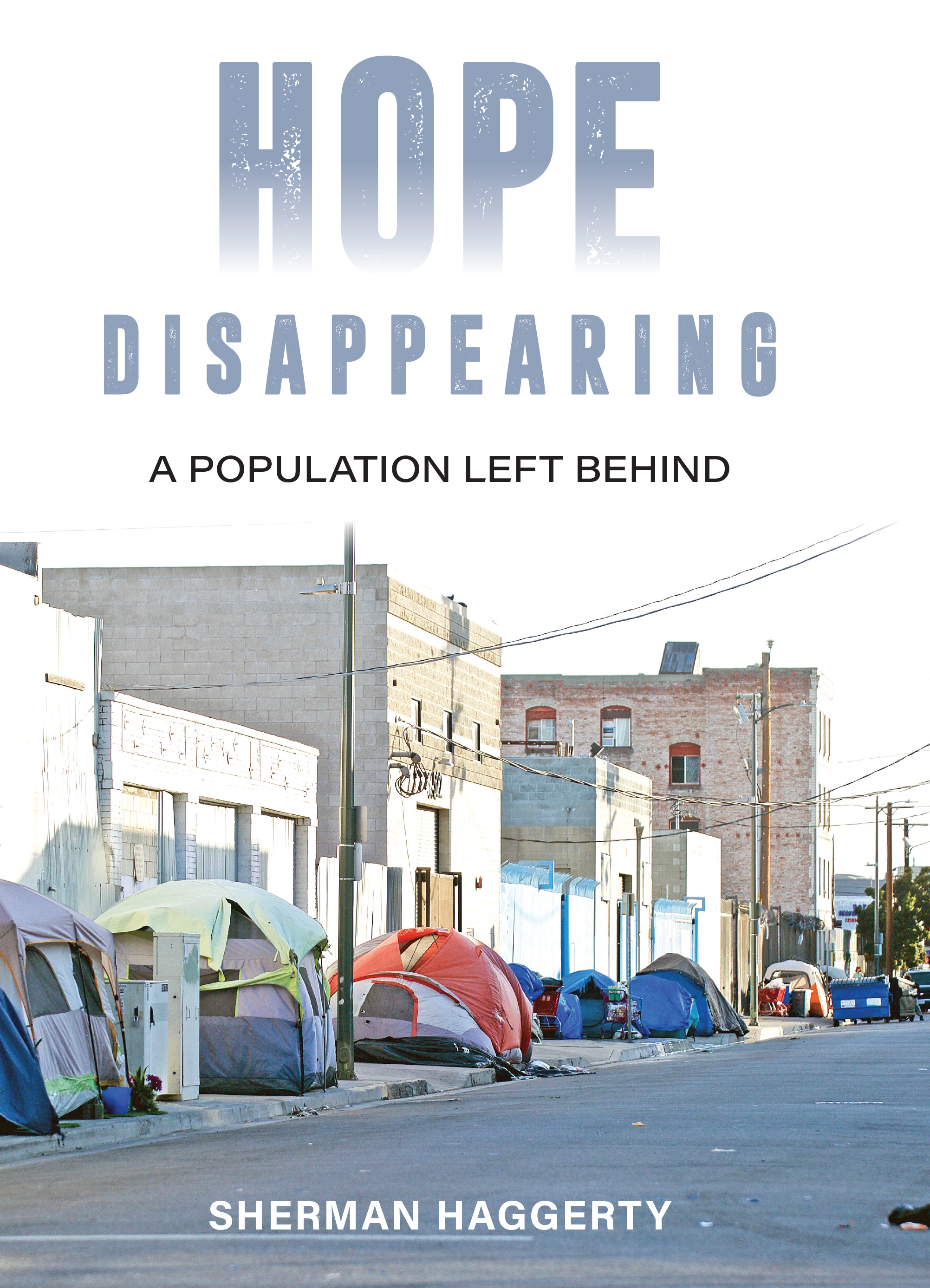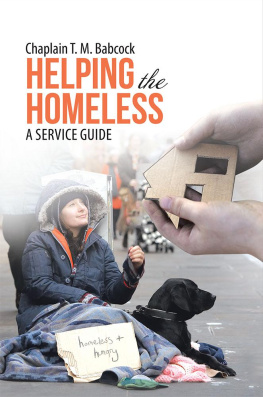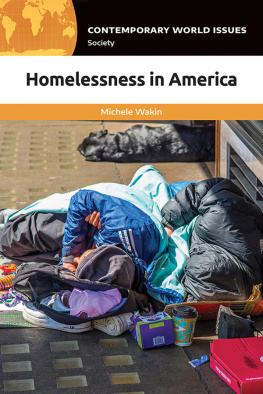Contents
Guide
Page List

HOPE
DISAPPEARING:
A POPULATION
LEFT BEHIND
A Behind-the-Scenes Look at the Growing Crisis of Homelessness in Our Nation
by Sherman Haggerty
IZZARD INK PUBLISHING
PO Box 522251
Salt Lake City, Utah 84152
www.izzardink.com
Copyright 2021 by Sherman Haggerty
All rights reserved. Except as permitted under the U.S. Copyright Act of 1976, no part of this publication may be reproduced, distributed, or transmitted in any form or by any means, or stored in a database or retrieval system, electronically or otherwise, or by use of a technology or retrieval system now known or to be invented, without the prior written permission of the author and publisher.
LIBRARY OF CONGRESS CONTROL NUMBER: 2021028379
Library of Congress Cataloging-in-Publication Data
Names: Haggerty, Sherman, author.
Title: Hope disappearing : a population left behind : a behind-the-scenes look at the growing crisis of homelessness in our nation / by Sherman Haggerty.
Description: First edition. | Salt Lake City, Utah : Izzard Ink Publishing, [2021] | Includes index.
Identifiers: LCCN 2021028379 (print) | LCCN 2021028380 (ebook) | ISBN 9781642280692 (hardback) | ISBN 9781642280685 (paperback) | ISBN 9781642280678 (ebook)
Subjects: LCSH: HomelessnessUnited States. | Shelters for the homelessUnited States. | Homeless personsUnited States. | HomelessnessGovernment policyUnited States. | Homeless personsServices forUnited States.
Classification: LCC HV4505 .H35 2021 (print) | LCC HV4505 (ebook) | DDC 362.5/0973dc23
LC record available at https://lccn.loc.gov/2021028379
LC ebook record available at https://lccn.loc.gov/2021028380
Designed by Ashley Tucker
Cover Design by Andrea Ho
Cover Images: Philip Pilosian/Shutterstock.com
First Edition
Contact the author at
Hardback ISBN: 978-1-64228-069-2
Paperback ISBN: 978-1-64228-068-5
eBook ISBN: 978-1-64228-067-8
Dedications and Thanks
I am dedicating this book to the following three people who work for the local affiliate of Volunteers of America:
Leo McFarland, chief executive officer
Amani Sawires, chief operating officer
Christie Holderegger, chief development officer
Collectively, these three individuals have provided 100 years of service and leadership to the underserved, undervalued, and disenfranchised citizens of Northern California. They have led the effort to provide shelter, meals, and critical services to homeless singles, homeless families, and homeless veterans. They have also served those struggling with mental health, abused seniors, those struggling with addictions, and the many who were victims of life-changing events that no one could have predicted. I can say with absolute certainty that Volunteers of America has provided more services under their leadership, to more underserved people in the Sacramento region during the past 30 years than any other organization.
I also want to dedicate this work to a handful of remarkable, humble, selfless people whom I had the ability to observe or work directly with during my time at Mather Community Campus. I decided to choose a few to thank publicly in this publication, but there are dozens more; you know who you are and you should take great pride in knowing how important you were in helping to improve lives immeasurably. Also, enormous gratitude goes to the students who worked so hard to get through this program from 1996 to 2019 and have continued, years later, to make very significant contributions in our community. Some of their stories are a part of this work. Special thanks to:
Beth Maarten | Holly Sexton | Ellen ONeal |
John Reilly | Paula Moulten | Beth Valentine |
Veronica Williams | Pat Fitzgerald | Marriane Friedrich |
Terri Wheeler | Ruby Yang | Chris Mann |
Elizabeth Garcia | Alan Knacke | Greg Williams |
Jenna Winn | Connie Aaron | Mary Ann Wheeler |
Jimmy Smits | Erika Acosta | Sam Frank |
Lynette Mabitun | Karen Christensen | Tom Crouse |
Russ Miller | Haley Armstrong | Marlo Miller |
Marcus Robinson | Kay Dowling | Carrie McCraken |
Matt Printup | Sue Harlan |
Including the entire staff from Next Move who stayed at Mather after the merger. |
Introduction
This book is based on my and others experiences working for Volunteers of America at a homeless transitional housing program in Northern California. These experiences represent the current changing landscape for the homeless population across the country and the future for them as citizens. (This work represents the views and opinion of the author and it is not intended to represent the opinions, views, or position of any private or public agency, business, or other individual.)
This book was written in an effort to raise concerns about the treatment of our homeless population; hope disappearing is not a clich. It accurately reflected the future options for more than two hundred people over a 2-day period in the spring of 2017. These people were on a waiting list for comprehensive homeless services, a list that was eliminated by mandate. It was one isolated incident, in one community, but it signaled a change in the direction of homeless services across the country and the future for thousands of people. It was the indirect result of federal policy changes that had been in the works for over a decade. This book provides significant detail about how those changes impacted (and are still impacting) the structure of local homeless services. It also looks at the collateral damage to the homeless people and the communities where they live. If you do not care about the growing number of human beings who are homeless, the demise of their future potential, or its potential social impact, then this book is not for you.
By contrast, this book also shares the power of kindness and caring. It is getting a little difficult in our time to figure out whether caring is really an important part of the fabric of our country. We have all witnessed some radical behavior that were told is the result of deep caring; however, the actions that have played out have more often hurt other people than helped them. Fortunately, I am an eternal optimist, especially about the majority of people in our community and the country. This book contains some remarkable true stories about the incredible impact kindness and caring made in the lives of individuals who had nowhere else to turn. Kindness is the tool we can use to open the damaged heart and help it to hope again. Caring can pave the path for hope to turn into opportunity.
I am critical in this book about the system that institutes sweeping policy changes from the federal level that ultimately impact the local community. I have strong opinions on why that system so often failed to produce the needed results. The culture that has developed inside of government offices at all levels does not promote or reward innovation or flexibility. The most influential decisions are being made by groups of people who are far removed from the problems they are supposed to address. That process leads to more problems than solutions. I hope to get you immersed in the complicated world of working through layers of government, when you have no authority, in the effort to serve the homeless.








